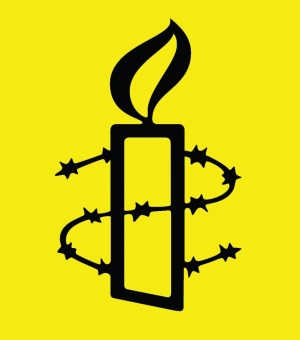ประเทศไทย: ยกเลิกและต้องไม่เพิ่มอำนาจทหารในการควบคุมตัวพลเรือน
แอมเนสตี้ อินเตอร์เนชั่นแนล
แถลงการณ์ (คำแปล)
7 กุมภาพันธ์ 2558
ประเทศไทย: ยกเลิกและต้องไม่เพิ่มอำนาจทหารในการควบคุมตัวพลเรือน
ทางการไทยต้องยกเลิกแผนการเพิ่มอำนาจทหารในการควบคุมตัวพลเรือนเป็นเวลาหลายเดือน โดยไม่มีการตั้งข้อหาและการไต่สวนคดีโดยทันที แอมเนสตี้ อินเตอร์เนชั่นแนลกล่าวในวันนี้
ปลายเดือนนี้ สภานิติบัญญัติแห่งชาติ (สนช.) ซึ่งแต่งตั้งโดยทหารที่ยืดอำนาจในการรัฐประหารเมื่อเดือนพฤษภาคม 2557 จะพิจารณาร่างแก้ไขพระราช บัญญัติธรรมนูญศาลทหาร พ.ศ. 2498 ซึ่งให้อำนาจผู้บัญชาการทหารสั่งควบคุมตัวพลเรือนได้ไม่เกิน 84 วัน
รูเพิร์ต แอ็บบอต (Rupert Abbott) ผู้อำนวยการงานวิจัยเอเชียตะวันออกเฉียงใต้ แอมเนสตี้ อินเตอร์เนชั่นแนล เปิดเผยว่า เป็นที่น่ากังวลอย่างยิ่งที่กองทัพไทยพยายามให้อำนาจมากขึ้นกับตนเอง เพื่อละเมิดสนธิสัญญาด้านสิทธิมนุษยชนที่เป็นเงื่อนไขที่ประเทศต้องปฏิบัติตาม ร่างแก้ไขกฎหมายดังกล่าวจะทำให้เกิดข้อกฎหมาย ซึ่งเจ้าหน้าที่ทหารสามารถใช้เพื่อสั่งควบคุมตัวบุคคลได้โดยพลการ แทนที่จะเป็นอำนาจของศาล พวกเขาควรถอนร่างกฎหมายนี้โดยทันที
ตามร่างแก้ไขกฎหมายดังกล่าว ในสภาพที่เกิด “เหตุสุดวิสัยหรือเหตุจำเป็นอื่น ๆ” ผู้บังคับบัญชาทหารสูงสุด ณ ที่นั้นอาจสั่งให้ควบคุมผู้ต้องหารวมทั้งพลเรือนได้ตามประมวลกฎหมายวิธีพิจารณาความอาญา ซึ่งปรกติเป็นอำนาจของศาลพลเรือน
นับแต่เกิดรัฐประหาร กองทัพได้เพิ่มอำนาจให้กับตนเองในการจับกุมพลเรือน โดยไม่มีข้อกล่าวหาหรือไม่มีโอกาสได้รับการไต่สวนคดีจากศาล โดยสามารถสั่งควบคุมตัวไว้เป็นเวลาไม่เกินเจ็ดวัน และมีการนำตัวมาขึ้นศาลทหารโดยไม่มีสิทธิอุทธรณ์คดี เมื่อรวมกับอำนาจที่มาจากร่างแก้ไขพระราช บัญญัติธรรมนูญศาลทหาร พ.ศ. 2498 แล้ว จะทำให้ทหารสามารถควบคุมตัวพลเรือนได้นานถึง 84 วัน
ที่ผ่านมามีบุคคลหลายร้อยคนที่ถูกควบคุมตัวโดยพลการตามอำนาจของกฎอัยการศึก และพลเรือนอีกหลายคนต้องเข้ารับการไต่สวนคดีในศาลทหารนับตั้งแต่มีการทำรัฐประหาร ถือว่าเป็นการละเมิดกฎหมายระหว่างประเทศ
“ประเทศไทยมีแนวโน้มมุ่งไปสู่การกดขี่ปราบปราม โดยอ้างว่าเพื่อรักษาความมั่นคงของประเทศ ที่ผ่านมากองทัพละเมิดพันธกรณีสิทธิมนุษยชนระหว่างประเทศ และจากร่างแก้ไขกฎหมายฉบับนี้ชี้ให้เห็นว่า กองทัพไม่มีความคิดที่จะเปลี่ยนแปลงสภาพที่เป็นอยู่เลย และถือว่าเป็นสิ่งที่ขัดกับข้ออ้างภายหลังการทำรัฐประหารว่าจำเป็นต้องใช้มาตรการที่จำกัดสิทธิเพียงชั่วคราว แต่อันที่จริงกองทัพได้ให้อำนาจกับตนเองอย่างกว้างขวางและโดยถาวร และได้ใช้อำนาจนั้นเพื่อการปฏิบัติมิชอบ”
“แนวโน้มดังกล่าวต้องยุติลงโดยทันที แทนที่จะเพิ่มอำนาจศาลทหาร หน่วยงานของรัฐควรยกเลิกอำนาจของผู้บัญชาการทหารและศาลทหารที่มีเขตอำนาจในการพิจารณาคดีต่อพลเรือน และให้ฟื้นฟูการคุ้มครองสิทธิมนุษยชนตามกรอบของรัฐธรรมนูญ และปฏิบัติตามพันธกรณีสิทธิมนุษยชนระหว่างประเทศของตน” รูเพิร์ต แอ็บบอตกล่าว
ในฐานะเป็นรัฐภาคีของกติการะหว่างประเทศว่าด้วยสิทธิพลเมืองและสิทธิทางการเมือง (International Covenant on Civil and Political Rights - ICCPR) ตามกฎหมายแล้ว ประเทศไทยไม่สามารถควบคุมตัวบุคคลได้โดยพลการ การควบคุมตัวบุคคลเป็นเวลาเกือบสามเดือนโดยใช้กฎหมายของฝ่ายบริหาร จึงเป็นการละเมิดสิทธิเหล่านี้อย่างชัดเจน นอกจากนั้น ผู้เชี่ยวชาญด้านสิทธิมนุษยชนขององค์การสหประชาชาติ ได้กำหนดเป็นหลักการไว้นานแล้วว่า ศาลทหารต้องไม่ทำหน้าที่ไต่สวนคดีต่อพลเรือน
*****
AMNESTY INTERNATIONAL
PRESS RELEASE
7 February 2015
Thailand: Revoke, don’t enhance army’s powers to detain civilians
Thai authorities must immediately cancel plans to grant the military enhanced powers to detain civilians for several months without charge or trial, Amnesty International said today.
The National Legislative Assembly, a body appointed by the military which seized power in a coup in May 2014, will later this month consider an amendment to the Statute of the Military Court Act, which would grant military commanders powers to detain civilians for up to 84 days.
“It is deeply worrying that the Thai military authorities are trying to give themselves even more power to violate the human rights treaties by which the country is bound. This proposed amendment will consolidate in law arbitrary detention ordered by a military officer instead of a judge, and should be withdrawn immediately,” said Rupert Abbott, Amnesty International’s Research Director for Southeast Asia and the Pacific.
The amendment provides that in circumstances of “force beyond human control or other necessity”, high-ranking military commanders may order the detention of suspects, including civilians processed under the Criminal Procedure Code – powers previously granted only to civilian courts.
Since the coup, the military has granted itself the power to arrest civilians without charge or trial for up to seven days and try them in military courts without the right to appeal. Coupled with the powers in the proposed amendment to the Statute of the Military Court Act, they will be able to detain civilians for up to 84 days.
Hundreds of individuals have been arbitrarily detained under martial law powers and scores of civilians have been tried in military courts since the coup, in violation of international law.
“Thailand is sliding down a slippery slope of repression of in the name of security. The military has already violated the country’s international human rights obligations and as this proposed amendment shows it appears to have no intention of reversing this trend, In fact, this makes a mockery of the claim that oppressive measures since the coup were temporary – the military is actually granting itself broader, and permanent powers to abuse,” said Rupert Abbott.
“This trend has to end immediately. Instead of enhancing the powers of military courts, authorities should repeal any powers military commanders and courts have over criminal procedures against civilians, restore constitutional human rights protections and honour Thailand’s international human rights obligations.”
As a state party to the International Covenant on Civil and Political Rights, Thailand is legally prohibited from arbitrarily depriving persons of their liberty. Detaining a person for almost three months by executive order clearly violates this right. In addition, UN human rights experts have long established the principle that military court must not try civilians.
Public Document
****************************************
For more information please call Amnesty International's press office in London, UK, on
+44 20 7413 5566 or +44 (0) 777 847 2126
email: press@amnesty.org
twitter: @amnestypress
International Secretariat, Amnesty International, 1 Easton St., London WC1X 0DW, UK




